Why gold prices rise when stock markets fall
- Economedia
- Oct 31, 2025
- 1 min read
When fear rises, gold shines. Throughout history, whenever stock markets tumble, investors rush toward gold—and there’s solid economics behind it.
Gold isn’t tied to company profits or central bank policies. It’s scarce, tangible, and universally trusted, which makes it a safe-haven asset. When markets crash or inflation surges, people sell volatile assets and park their wealth in gold to preserve value.
The 2008 financial crisis, the pandemic crash, and even recent geopolitical tensions all triggered the same response: falling stock indices and soaring gold prices. In times of uncertainty, demand spikes while supply remains fixed, pushing prices higher.
It’s partly psychological, partly rational. Even central banks diversify reserves into gold to hedge against currency depreciation. Historically, gold tends to move opposite to equities, offering balance in an investor’s portfolio.
So while your mutual fund might shrink during a market panic, your grandmother’s gold bangles quietly prove their worth once again.



Comments